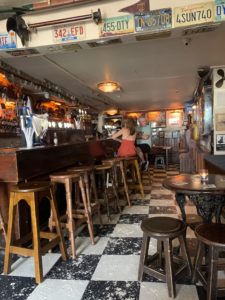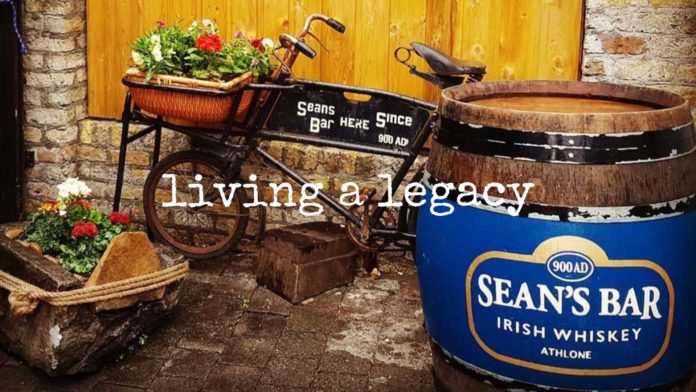I am down to my next to last sermon at the church where I have been bridge pastor since the beginning of last December. They are moving into a promising new chapter as a new settled pastor joins them in early September and I am moving into Whatever Is Coming Next, a chapter that has yet to be fully defined.
My idea for my sermon came to me as Ginger and I sat in a pub on our last full day in Ireland; Guinness, it seems, is not only good for strength, but also for sermon ideas—in moderation, of course. The text is Isaiah 58:9-12. I’ll let my sermon tell the rest of the story.
_________________________________
When Ginger and I first moved to Boston in 1990, we couldn’t get over how old things were. The first house we owned in Charlestown was built around 1840. Having moved from Texas, where anything over fifty felt ancient, we felt like we were living in the middle of history. Then we had a chance to go to Paris. As we stood in Notre Dame cathedral, we could overhear a tour guide describing the two huge stained glass windows. One, he said, was a new window–a replacement after a fire–that had been put in place in the mid-1500s.
Our little row house in Boston suddenly felt new as well.
During our time in Ireland over the last couple of weeks, we saw lots of old things. We walked around the remnants of old castles, marveled at the miles and miles of stone walls that stood without mortar, and stayed in hotels housed in stone buildings dating back centuries. All of those were things I expected. But on our last full day in Ireland I was surprised by what we found.
Our task that day was to drive from Galway to Dublin so we could fly back to Boston the next day. I looked at the map to find somewhere in between to stop for lunch and saw the name Athlone about halfway along the highway. When I searched to learn more about the city, I found out it was home to Sean’s Bar, which is certified by both the Guinness Book of World Records and the Irish National Museum as the oldest bar in Ireland–dating back to 900. That date means less time passed between Jesus being on earth and the opening of the bar than between the opening of the bar and today.
We knew we had to stop–and we did.
The building was unassuming. The pub was quiet and cozy and opened up on a patio that had been built more recently. On one wall was a shadow box that held a piece of an earlier building, which was basically a bunch of sticks held together by some sort of mud mixture. The room we were in wasn’t from 900, but the bar was part of a continuous lineage.
had been built more recently. On one wall was a shadow box that held a piece of an earlier building, which was basically a bunch of sticks held together by some sort of mud mixture. The room we were in wasn’t from 900, but the bar was part of a continuous lineage.
What I have since learned is Athlone is the English way of saying the Gaelic name, Atha Luain, which means “the ford of Luain.” Before bridges were built, this spot was where people could ford the River Shannon. Luain was the one who both provided a way across the river and a place for refreshment and rest, starting in 900. A town grew up around the inn, and then a castle was built in the twelfth century. Through all the changes, the pub has continued to take care of people.
As one of my friends noted when she saw our pictures, “Bars have been a necessity for a long time.” The idea that everyone wants to go to a place where everybody knows your name is much older than we think.
Soon after we got back, I read an article that said for the first time in American history people who go to church are in the minority. In 1990, seventy percent of Americans participated in worship; that has now fallen below fifty percent. Those of us who go to church live with the assumption that churches have been a necessity for a long time, too. Perhaps, what we miss is that it can’t stay the same if it is going to endure.
I wonder how many times over the years the patrons of Luain’s Inn or Sean’s Bar have lamented a change in location or decor or beverage options. My guess is at least every few years over the thirteen centuries, someone has said, “Well, it’s not what it used to be,” and yet, it’s still here.
We have lots of reminders around us that much of life works that way. We think of ourselves as being the same person our whole life, and yet our skin cells regenerate every two weeks, our stomach cells every couple of days, and our bones every ten years, to name a few. As we age, we don’t keep much original material and yet we are still ourselves. Our identity does not require us to stay the same; in fact, we have to change to stay alive.
One of the things I have enjoyed since I got back has been reading the email thread about the ways in which you as a congregation are preparing for a new year and for a new pastor. Those two things, along with what appears to be the first fall in a while not totally encumbered by the pandemic, have created space to dream and plan. It has also made room for trying to get back to the way things were. Those two impulses can pull against each other.
The words from Isaiah we read this morning were spoken to people who were working to rebuild what had been lost and trying to figure out how to keep going. Isaiah’s call was to do more than try to reinstate old patterns. Instead, he said, be healers. Repairers of the breach.
Be the ones who help others cross the river and provide refreshment and rest for them when they do.
We do not exist because of our institutions or for our institutions–that’s true about churches and governments and workplaces. We are made for one another. We are built to be healers, helpers, caregivers–and receivers: people who tend to one another.
One of the stops we made on our Peace Retreat was in a town called Rostrevor, which is in northern Ireland. As we were getting off the bus, Ginger and I saw a man walking two miniature Schnauzers, so we were quick to cross the street and talk to him. After we had met the dogs, we began to talk to him. His name was Paul. He asked what we were doing in Ireland and we said we were with a group hoping to learn more about how to be peacemakers by hearing the stories of those who are working for peace in Ireland.
“I was in prison in Manchester during the Troubles,” Paul said. He went on to tell us he had been sentenced to twenty-four years but got out after eleven years because of good behavior. “I was changed by my time in prison. I am a different person. I was a Republican (one of those fighting for a unified Ireland), but I’m not now. What matters most is that we learn how to be friends with one another.”
Across the street from Paul was a school that advertised itself as “integrated”–meaning Protestant and Catholic students attended together–and next to it was a church that had been converted into a restaurant and bar. As Ginger and I sat at one of the outside tables, we watched the church fill up with various groups of people sharing their lunches and lives together, and I wondered what the former congregation had missed that the restaurant seemed to be getting right when it came to making people feel like they belonged in that space.
Sean’s Bar has not survived because Luain had a plan for lasting a millennium. What he did was feed people and help them cross the river and those who followed him found their own version of hospitality to offer. Though they boast about being the oldest bar, that is far from the point. The point is that they tend to people day after day, and have done so month after month such that the years have stacked up into centuries.
Likewise, as you look to the days ahead and the hope of new life here in Westbrook, remember a couple of things. One, the point is not to last forever, but to meet the needs at hand. As Gareth Higgins, who led our retreat, says, look for ways to make the world less broken and more beautiful. Second, as you make room for and take care of one another, and of those who will come to join you, remember it ultimately doesn’t matter what order the hymns come in, or what prayer is said when, or whether you like every piece of music that is played.
What matters is you are here together and you want to widen the circle of belonging. You have a long history, but as you lean into that, remember the congregation that exists today is most likely quite different than the one that started here, and different from many of the versions of church that have inhabited this space since. Perhaps that is why Isaiah said we are called to be “repairers of the breach”–we are called to look for the little things (and some big things, too) that will make it easier for people to get across whatever boundary or difficulty that keeps them from feeling like they belong so they can find rest and refreshment.
God doesn’t expect us to last forever. God does call us to love one another with every moment we have. Amen.
Peace,
Milton

What a wonderful thinking! Thanks again, Milton, for your astute eye and mind and spiritual summing up!
This is a beautiful sermon, great writing and comforting. What wonderful thoughts to share and leave with the congregation in Westbrook. Keep writing, keep on sharing. I’m thankful to have your words to read!!
☮️Gail